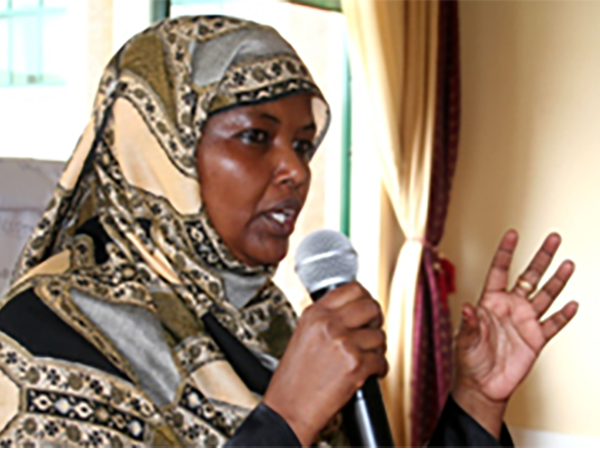Rembering a passionate peacebuilder: Dekha Ibrahim Abdi

The peacebuilding world has been shaken by the loss of Dekha Ibrahim Abdi. A passionate peacebuilder, she impacted the lives of many: from her home town of Wajir in Northern Kenya, to as far afield as Asia, Europe, Middle East and North America.
Dekha was incredibly committed to peacebuilding yet was always humble about her role in any peace process. On many occasions she allowed others to take credit for her work for the sake of peace. Nuria Abdi, a close friend and peacebuilder from Interpeace recalls, “She would never give up. In fact she was known to say ‘in any crisis there is an opportunity’.”
Dekha was in Wajir, a rural town in Northern Kenya that has experienced waves of conflict over the years. In the early 1990’s Dekha was teaching at a local school when the conflict erupted into violence. This outbreak spurred Dekha and her colleagues to act. This decision to help was the foundation of her life long mission to see her community live in harmony and peace.
After playing a large role in resolving the conflict, Dekha was one of the founding members of the ‘Wajir Peace and Development Committee’. The approach they took proved successful. It was based on the methods of conflict resolution traditionally used by ethnic Somalis in the area. Comprised of members from every clan, the initiative quickly demonstrated the value of dialogue and community involvement.
Her work quickly took her to many places, including the UK, Cambodia, Israel, Palestine, and a variety of countries in including many parts of Africa. She started locally but spread to have global impact - she truly was an international peacebuilder. In 1998 Dekha joined the staff of ‘Responding to Conflict’, an international non-governmental organization, based out of Birmingham, UK, as the learning and training coordinator. She also continued to work domestically in her native Kenya. In 2005 Dekha was named Kenyan Peace Builder of the Year.
The successful model to build lasting peace was so influential that in 2007 she was awarded the Swedish Right Livelihood Award, often viewed as the alternative Nobel Peace Prize.
As testament to her character, Dekha used the prize money allotted to her from the Livelihood Award as seed money for the proposed Wajir Peace University in her native town of Wajir. This shows Dekha’s dedication to peacebuilding. She was personally committed to passing on her knowledge to whoever sought peace.
Dekha often stated that it was her early experiences in Wajir along with her Muslim faith, which shaped her perceptions and desire to work as a peacebuilder. She was known to use the techniques she learned early on in Wajir, combined with teachings from the Quran in order to broker peace. Her tolerance of alternative views and her passion for peace were integral. She was renowned for reconciling warring factions, Christians, Muslims, and strongly believed in the power of dialogue.
Dekha was one of the most influential peacebuilders in Africa. “She was an outstanding peacebuilder, sister, mother, and friend. She was simply someone great!” remembers Nuria. Dekha’s work has saved countless lives. She will be greatly missed by everyone who knew her.
Dekha passed away on 14 July 2011 following a car accident.
